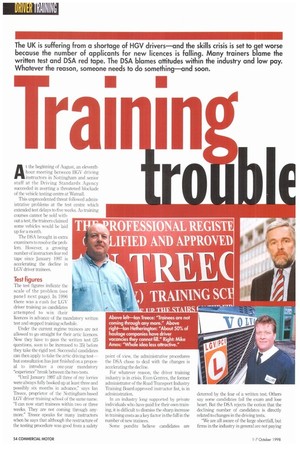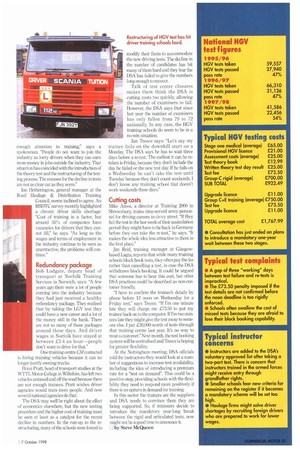The UK is suffering from a shortage of HGV drivers—and
Page 56

Page 57

If you've noticed an error in this article please click here to report it so we can fix it.
the skills crisis is set to get worse because the number of applicants for new licences is falling. Many trainers blame the written test and DSA red tape. The DSA blames altitudes within the industry and low pay. Whatever the reason, someone needs to do something—and soon.
At the beginning of August, an eleventhhour meeting between HG' driving instructors in Nottingham and senior staff at the Driving Standards Agency succeeded in averting a threatened blockade of the vehicle testing centre at Watnall.
The DSA brought in extra examiners to resolve the problem. However, a growing number of instructors fear red tape since January 1997 is accelerating the decline in LGV driver trainees.
Test figures
The test figures indicate the scale of the problem (see panel next page). In 1996 there was a rush for LGV driver training as candidates attempted to win their licences in advance of the mandatory written test and stepped training schedule.
Under the current regime trainees are not allowed to go straight for their artic licences. Now they have to pass the written test (25 questions, soon to be increased to 35) before they take the rigid test. Successful candidates can then apply to take the artic driving test— but consultation has just finished on a proposal to introduce a one-year mandatory "experience" break between the two tests.
"Until January 1997 all three of my lorries were always fully booked up at least three and possibly six months in advance," says Ian Treece, proprietor of the Nottingham-based LGV driver training school of the same name. "I can now start trainees within two or three weeks. They are not coming through anymore." Treece speaks for many instructors when he says that although the restructure of the testing procedure was good from a safety point of view, the administrative procedures the DSA chose to deal with the changes is accelerating the decline.
For whatever reason, the driver training industry is in crisis. Even Centrex, the former administrator of the Road Transport Industry Training Board-approved instructor list, is in administration.
In an industry long supported by private individuals who have paid for their own training, it is difficult to dismiss the sharp increase in training costs as a key factor in the fall in the number of new traines.
Some pundits believe candidates are deterred by the fear of a written test. Others say some candidates fail the exam and lose heart. But the DSA rejects the notion that the declining number of candidates is directly related to changes in the driving tests.
"We are all aware of the large shortfall, but firms in the industry in general are not paying enough attention to training," says a spokesman. "People do not want to join the industry as lorry drivers when they can earn more money in jobs outside the industry. That situation has coincided with the introduction of the theory test and the restructuring of the testing process. The reasons for the decline in tests are not as clear cut as they seem."
Ian I letherington, general manager at the Road Haulage & Distribution Training Council, seems inclined to agree. An RHDTC survey recently highlighted a chronic driver skills shortage: "Cost of training is a factor, but around 50% of companies have vacancies for drivers that they cannot fill," he says. "As long as the wages and terms of employment in the industry continue to be seen as unattractive, the problems will continue."
Redundancy package
Bob Ludgate, deputy head of transport at Norfolk Training Services in Norwich, says: "A few years ago there were a lot of people coming into the industry because they had just received a healthy redundancy package. They realised that by taking the LG V test they could have a new career and a lot of the money still in the hank. 'I'here are not so many of those packages around these days. And driver wages in Norfolk have stayed at between £3-4 an hour—people don't want to drive for that."
One training centre CM contacted is hiring training vehicles because it can no longer justify owning trucks.
Brian Pratt, head of transport studies at the WTTL Motor College in Wiltshire, has left two vehicles untaxed and off the road because there are not enough trainees. Pratt wishes driver agencies would train more people. And now several national agencies do that.
The DSA may well be right about the effect of economics elsewhere, but the new testing procedure and the higher cost of training must be seen at least as a catalyst for the recent decline in numbers. In the run-up to the restructuring, many of the schools were forced to modify their fleets to accommodate the new driving tests. The decline in the number of candidates has hit many of them hard and they fear the DSA has failed to give the numbers long enough to recover.
Talk of test centre closures makes them think the DSA is cutting costs too quickly, allowing the number of examiners to fall. However, the DSA says that since last year the number of examiners has only fallen from 79 to 72 nationally. In any case, the HGV training schools do seem to be in a no-win situation.
Ian Treece says: "Let's say my trainee fails on the downhill start on a Monday. The DSA says he has to wait three days before a re-test. The earliest it can be retaken is Friday, because they don't include the day he failed or the new test day. If he fails on a Wednesday he can't take the test until Tuesday because they don't count weekends. I don't know any training school that doesn't work weekends these days."
Cutting costs Mike Amos, a director at Training 2000 in Shrewsbury, trains time-served army personnel for driving careers in civvy street: "If they fail the test in the last week of their assimilation period they might have to be back in Germany before they can take the re-test," he says. "It makes the whole idea less attractive to them in the first place."
Jim Reid, training manager at Glasgowbased Lagta, reports that while many training schools block-book tests, they often pay the fee rather than cancelling a test, in case the DSA withdraws block-booking. It could be argued that someone has to bear this cost, but other DSA practices could be described as non-customer friendly.
"I have to confirm the trainee's details by phone before 12 noon on Wednesday for a Friday test," says Treece. "If I'm one minute late they will charge me 0350 to put my trainee back on to the computer. If I'm two minutes late they might give the test away to someone else. I put 1:30,000-worth of tests through that training centre last year. It's no way to treat a customer." Next month, the test booking system will be centralised and Treece is hoping for greater flexibility.
At the Nottingham meeting, DSA officials told the instructors they would look at a number of suggestions to increase test availability, including the idea of introducing a premium rate for a "test on demand". This could be a positive step, providing schools with the flexibility they need to respond more positively if there is an upturn in demand for training.
In this sector the trainers are the suppliers and DSA needs to convince them they are being supported. So, if ministers decide to introduce the mandatory year-long break between the rigid and articulated tests, now might not be a good time to announce it.
Li by Steve McQueen
















































































































